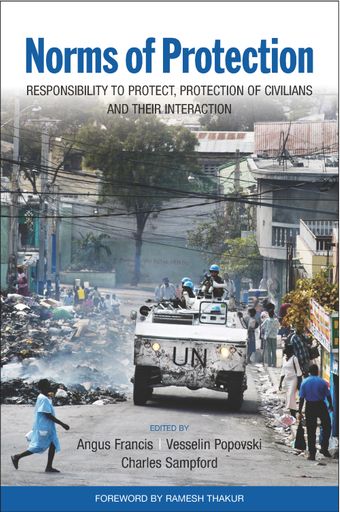- Home
- Books
- Norms of Protection
- Chapter
Towards a “responsibility to provide”: Cultivating an ethic of responsible sovereignty in Southeast Asia

- Author: See Seng Tan
- Main Title: Norms of Protection , pp 249-267
- Publication Date: January 2013
- DOI: https://doi.org/10.18356/81d2f4bc-en
- Language: English
At the United Nations World Summit of 2005, member countries from the Association of Southeast Asian Nations (ASEAN) unexpectedly adopted the “responsibility to protect” doctrine – popularly known as R2P – concerning the protection of populations from genocide, ethnic cleansing, war crimes and crimes against humanity (UNGA, 2005). However, ASEAN states’ responses to UN Security Council Resolution 1674 – which reaffirmed R2P and endorsed the use of appropriate measures where necessary to ensure its implementation – were relatively lukewarm. The shared caginess among the Southeast Asians towards Resolution 1674 implied a collective adherence to sovereignty as the right of nations rather than a responsibility to the peoples whom they represent. As a senior official from Singapore once urged his ASEAN colleagues, any deviation from their regional organization’s long-standing emphasis on the doctrines of sovereignty and non-interference would prove injurious to the region’s stability, since the upkeep of those principles constitutes “the key reason why no military conflict has broken out between any two ASEAN countries since the founding of ASEAN” (Jayakumar, 1997). Arguably, even the academic consensus on ASEAN has continually fostered the impression that Southeast Asian states rarely flout their non-interference principle (Jones, 2010). Indeed, ASEAN’s typical rationalizations of its own inaction in the face of domestic crises and intramural disputes within Southeast Asia have encouraged the perception of the Association as an effete organization, irrelevant to regional security other than for its members’ own parochial ends.
© United Nations
ISBN (PDF):
9789210558945
Book DOI:
https://doi.org/10.18356/85667ed1-en
Related Subject(s):
Human Rights and Refugees
Sustainable Development Goals:
-
From This Site
/content/books/9789210558945c016dcterms_title,dcterms_subject,pub_keyword-contentType:Journal -contentType:Contributor -contentType:Concept -contentType:Institution105
/content/books/9789210558945c016
dcterms_title,dcterms_subject,pub_keyword
-contentType:Journal -contentType:Contributor -contentType:Concept -contentType:Institution
10
5

